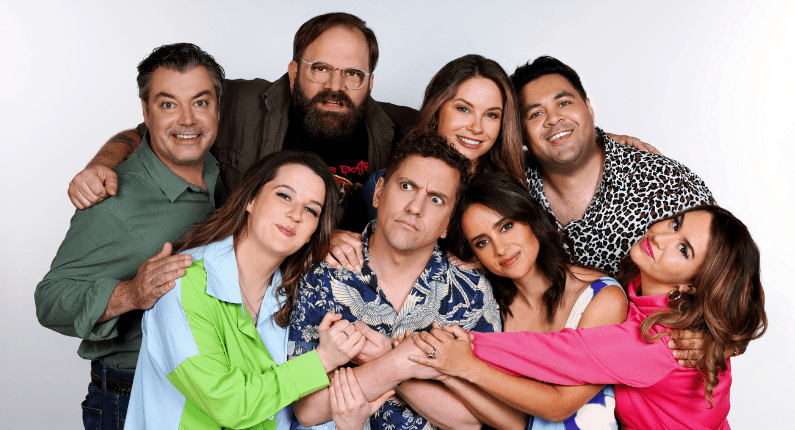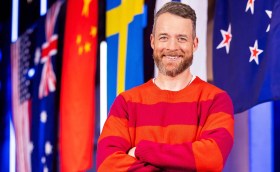Bringing back sketch comedy in 2023 is a gutsy move. Sketch comedy thrived for decades on Australian free-to-air television largely because it was both cheap to make and popular.
Today, if you want cheap TV, reality television is basically free once you factor in sponsorships and promotional deals. And if you want to watch short sketches, you’ve got YouTube, TikTok, and half a dozen other social media platforms serving up more material in a day than you could watch in a week.
So Seven’s new prime-time sketch show We Interrupt This Broadcast is defiantly retro. And that’s the point. Seven’s attempts at comedy over the last few years have been based almost entirely around nostalgia. Hey Hey it’s Saturday ‘best of’ specials, Kath & Kim reunions, a Paul Hogan roast; these are the kind of comedy programs you make when you want to remind people of things they used to laugh at, not actually make them laugh.
One comedy hit they can’t repeat is 1989’s Fast Forward. A massively popular collection of TV and commercial parodies, it presented its sketches as if the viewer was channel-surfing, jumping from one TV show parody to another and then back. It’s too slow and dated to repeat now, even if Seven still had the rights; We Interrupt This Broadcast is what you get when you remake it in 2023.
Depressingly accurate
As an hourly summary of the state of Australian free-to-air television, it’s depressingly accurate. Many of the parodies are of reality television – MAFS, Survivor, First Date, Border Force, a version of UK shag-fest Love Island renamed Lip Island – with a few outliers, like clips from a 1950s version of Play School. Is the joke that in the old days people were sexist and happily wallowed in chemicals we now know are toxic? Hey, no spoilers.
We Interrupt This Broadcast may not always go for quality with their jokes, but they make up for it in quantity (and often the jokes aren’t that bad either). The parodies barely run over a minute each time, if that: we get the establishing logo, one gag, then it’s onto the next one. If it doesn’t work, or isn’t that great, here’s the next joke. And the next.
Sometimes they pull the old Fast Forward trick of cutting a longer sketch in two by inserting a different sketch in the middle, but here ‘longer’ means a couple minutes at most. As for the sketches themselves, there’s enough variety to keep the hour run time from dragging too badly, ranging from direct parodies to more concept-based material (such as a stand-up special Mum’s Friend Sue, which is just a middle-aged woman rambling on).
What if a contestant on The Bachelor couldn’t remember the women’s names? What if the questions on You Can’t Ask That were really boring? What if the boss on The Chase couldn’t find her glasses that were on her head? As comedy concepts they’re hardly classics, but they don’t have to be. Set-up, punchline, next joke.
Surprising
What’s surprising about this rapid-fire emphasis on scripted jokes (there’s 25 writers listed in the credits) is that for a long while now Australian sketch shows have largely been performance-led. They’ve often featured (relatively) lengthy sketches and broad characters designed to allow the cast to show their stuff, with jokes a secondary consideration at best.
Some series, like Amazon’s 2021 effort The Moth Effect, were based around guest stars like Bryan Brown, David Wenham, and Jack Thompson; others, like Foxtel’s Open Slather, relied on faces famous for their earlier sketch work, such as Gina Reily, Marg Downey, Jane Turner, Michael Veitch and Magda Szubanski. The focus was on creating popular characters and catchphrases: if this approach had ever worked, maybe you’d remember those shows.
Here, the fast pace and one-joke nature of most of the sketches means there’s little time for anything else to get a laugh. Despite a strong cast that includes familiar faces such as Greg Larsen, Mad as Hell’s Christie Whelan Browne, Michelle Brasier and Adele Vuko, when sketches are around 90 seconds long there’s not a lot of room for them to go big with their performances – though the cast in some of the food show parodies try pretty hard.
So there are lots of jokes, and they’re often not bad; even when they return to parody the same shows over and over, they usually find different gags to make (unless it’s Lip Island). But plenty of Australian (and overseas) sketch shows have started strong out the gate, then returned the following week to do basically the same jokes all over again. Based on the first episode, We Interrupt This Broadcast seems to be working hard to avoid that trap.
Fingers crossed the increasingly barren landscape of free-to-air television keeps giving them enough material to work with.
We Interrupt This Broadcast airs Tuesdays 7.30pm on Seven, and is available online on 7Plus
Actors:
Director:
Format: Movie
Country:
Release:





